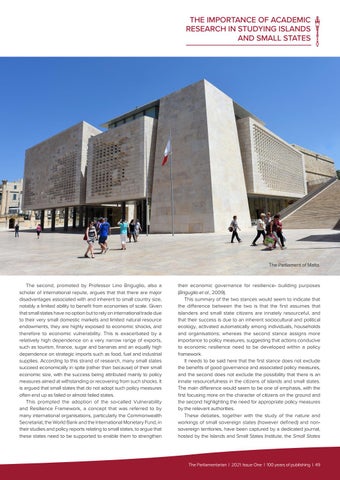THE IMPORTANCE OF ACADEMIC RESEARCH IN STUDYING ISLANDS AND SMALL STATES
The Parliament of Malta.
The second, promoted by Professor Lino Briguglio, also a scholar of international repute, argues that that there are major disadvantages associated with and inherent to small country size, notably a limited ability to benefit from economies of scale. Given that small states have no option but to rely on international trade due to their very small domestic markets and limited natural resource endowments, they are highly exposed to economic shocks, and therefore to economic vulnerability. This is exacerbated by a relatively high dependence on a very narrow range of exports, such as tourism, finance, sugar and bananas and an equally high dependence on strategic imports such as food, fuel and industrial supplies. According to this strand of research, many small states succeed economically in spite (rather than because) of their small economic size, with the success being attributed mainly to policy measures aimed at withstanding or recovering from such shocks. It is argued that small states that do not adopt such policy measures often end up as failed or almost failed states. This prompted the adoption of the so-called Vulnerability and Resilience Framework, a concept that was referred to by many international organisations, particularly the Commonwealth Secretariat, the World Bank and the International Monetary Fund, in their studies and policy reports relating to small states, to argue that these states need to be supported to enable them to strengthen
their economic governance for resilience- building purposes (Briguglio et al., 2009). This summary of the two stances would seem to indicate that the difference between the two is that the first assumes that islanders and small state citizens are innately resourceful, and that their success is due to an inherent sociocultural and political ecology, activated automatically among individuals, households and organisations; whereas the second stance assigns more importance to policy measures, suggesting that actions conducive to economic resilience need to be developed within a policy framework. It needs to be said here that the first stance does not exclude the benefits of good governance and associated policy measures, and the second does not exclude the possibility that there is an innate resourcefulness in the citizens of islands and small states. The main difference would seem to be one of emphasis, with the first focusing more on the character of citizens on the ground and the second highlighting the need for appropriate policy measures by the relevant authorities. These debates, together with the study of the nature and workings of small sovereign states (however defined) and nonsovereign territories, have been captured by a dedicated journal, hosted by the Islands and Small States Institute, the Small States
The Parliamentarian | 2021: Issue One | 100 years of publishing | 49




